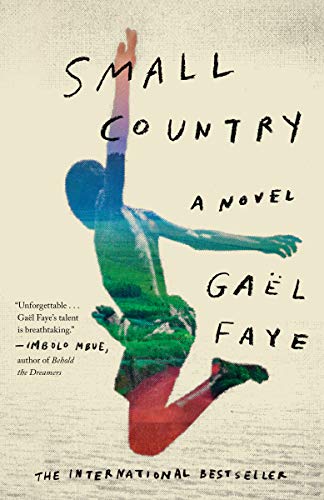
Small Country is a fictional memoir of a childhood spent in Burundi and abruptly brought to an end by the outbreak of violence in Burundi and neighbouring Rwanda in the 1990s. It is the first novel of French-Rwandan musician and hip-hop artist Gaël Faye, who started life in Burundi before having to flee to France as a teenager. Small Country has won a number of awards in France where it was published in 2016. It has now been translated into 35 languages, the English translation appearing in 2018.
The events of Small Country are told from the perspective of Gabriel (or Gaby), a 33-year-old man living on the outskirts of Paris. It is his birthday, and alone in a bar he reflects upon his life in France. After twenty years he still does not feel at home.
"Living somewhere involves a physical merging with its landscape, with every crevice of its environment. There’s none of that here. I’m passing through. I rent. I crash. I squat. My town is a dormitory that serves its purpose. My apartment smells of fresh paint and new linoleum. My neighbours are perfect strangers, we avoid each other politely in the stairwell."
Gaby’s life, as he sees it, has been ‘one long meandering’ in which nothing evokes real passion. His life in Burundi frequently infiltrates his thoughts. Looking out of a window, ‘through the grey sticky drizzle’ he notes that ‘there’s not a single mango tree in the tiny park wedged between the shopping centre and the railway lines’. Absorbed by the idea of returning, Gaby recalls his childhood in Burundi.
Ten-year-old Gaby leads an exuberant existence in a neighbourhood of expats and prominent Burundians, outside the city of Bujumbura, the former capital of Burundi. He lives with his French father, and often sees his Rwandan mother. He worries over whether or not they will get back together. His days are spent roaming the impasse,the cul-de-sac in which he lives, with the other four boys who live there. They call themselves the ‘Kananira Boyz’ (inspired by the name of their neighbourhood and Boyz II Men), designate an abandoned shell of a VW Combi ‘headquarters’ and an older boy, Francis, is declared their arch nemesis. Together they steal mangoes, float down the river in dugouts made from banana trees, build tree houses in nearby fig trees, and discuss their futures. The boys are bolstered by their friendship and antics: ‘we felt at one with the world, in our hideout on the patch of wasteland by our street’.
In the book’s most vibrant chapter, Gaby recounts his eleventh birthday party, attended by most of the neighbourhood. Akin to a panning shot, Faye moves between the scenes of the party: an eccentric Belgian telling stories on the veranda; partygoers drinking and dancing in the moonlight; waiters fetching beer and serving a crocodile barbeque; Gaby and the Boyz lounging on the pick-up parked outside; and a disembowelled crocodile lying at the end of the garden. A fight breaks out between the boys – two of whom end up wrestling in the grass, comically rolling over into the crocodile carcass and emerging ‘smeared with crocodile innards’. When the electricity is cut, the party continues, and live music is played to a dancing crowd in the rain. It is an exhilarating passage, brimming with energy. At the close of the evening Gaby recounts:
"Soon my birthday would be over, but I chose to savour that minute before the rain came down in earnest, that taste of suspended happiness as music joined our hearts and filled the space between us, celebrating life, this moment in time, the eternity of my eleven years, here, beneath the cathedral that was the rubber fig tree of my childhood, and deep down I knew that everything would turn out all right."
Fatefully, it is not long after this party that Burundi and Rwanda descend into civil war. From within his privileged community, Gaby is at first insulated from the conflict, only hearing the sound of distant gunshots at night. Gradually, however, the war infiltrates every corner of the country, seeping into Gaby’s world, as he bears witness to the mass killings in Bujumbura. He must also cope with the effective loss of his mother, who descends into psychosis following the mass killing of her family in Rwanda. It is an abrupt and premature end to Gaby’s childhood, as he tries to make sense of the violence that surrounds him and is himself dragged into its torrent.
Small Country is written in sparse but poetic prose, in what is a beautiful translation. Faye moves at an easy pace, evoking a tangible world for the reader without being excessively descriptive. Faye also successfully constructs the perspective of a child. While the narrative is framed by grown-up Gaby’s lyrical reminiscing, the most compelling insights come from young Gaby as he exuberantly embarks on escapades with his friends, frets about his parents’ relationship, and contends with his increasingly destabilised environment.
A flaw of the novel is its occasional departure from this perspective in order to educate its reader. 11-year-old Gaby happens to overhear conversations of the grown-ups in which they explain the intricacies of the conflict in Rwanda and Burundi, going so far as to detail the plans of the Hutu insurgency, the failure of the Arusha peace agreements, and the reluctance of the United Nations to intervene. These kind of textbook explanations of the conflict are jarring, as they could not plausibly be understood and remembered by a child, and disturb the evocative perspective of the child.
This blemish notwithstanding, the novel is a rich addition to literary accounts of a childhood spent – and disrupted – on the African continent. Alexandra Fuller, the author of Don’t Let’s Go to the Dogs Tonight: An African Childhood, has written that:
The memoirs that have come out of Africa are sometimes startlingly beautiful, often urgent, and essentially life-affirming, but they are all performances of courage and honesty. Far from the tell-all confessionals more usual in western memoirs, the African memoir lays bare the bones of what it is to be a child, survivor, or perpetrator of oppression and conflict.
While a work of fiction, the authenticity and clear reliance on Faye’s own experience in Burundi, make Small Country such a book: Faye courageously delves into what it is to be a child wrenched from security and happiness, and thrown into the depths of a conflict he does not understand. A bestseller in France, Small Country also deserves a wide readership in Africa.
By Isabeau Steytler
 SLiPStellenbosch Literary Project
SLiPStellenbosch Literary Project 
